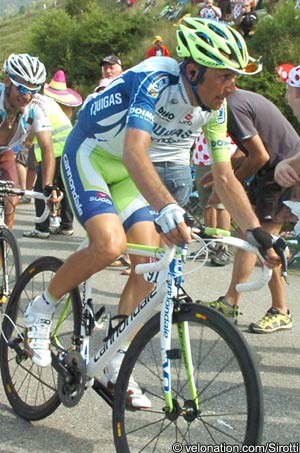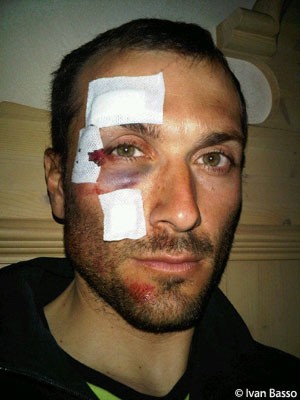Liquigas-Cannondale rider disappointed with his Tour de France but staying optimistic
 Ivan Basso (Liquigas-Cannondale) was one of many riders that staked his whole season around bid to win the Tour de France. The 33-year-old passed up the opportunity to defend his Giro d’Italia crown to be as fresh as possible for the French race, but came away disappointed with eighth place, 7’23” behind winner Cadel Evans (BMC Racing).
Ivan Basso (Liquigas-Cannondale) was one of many riders that staked his whole season around bid to win the Tour de France. The 33-year-old passed up the opportunity to defend his Giro d’Italia crown to be as fresh as possible for the French race, but came away disappointed with eighth place, 7’23” behind winner Cadel Evans (BMC Racing).
Since the race, Basso has been evaluating what went wrong in the three-week race, as he told Italian newspaper La Repubblica, but in the knowledge that there was nothing more that he cold have done.
“You have to digest everything, and quickly,” he explained “Cycling doesn’t let you sit back, whether things go well or whether they go less well.”
“I think I did everything as well as I could,” he added.
While Basso feels that he did as much as he could to train and prepare for the race, his crash on the descent of Mount Etna, as he coincided a training camp with the Giro’s visit to the Sicilian volcano, put his progress back and affected a key aspect of his race.
“I’m not complaining; it’s not an excuse,” he said. “But there are some objective considerations to make. The consequences were very heavy. Apart from the area around my eye – and my eyesight impaired – I had problems with my cervical vertebrae and lost some feeling in my wrists, which prevented me from working on my time trial bike.
“It could be seen in the team time trial where we lost 1’20” [actually, 57 seconds – ed]; I couldn’t stay in the aero position.
“Then I had to take antibiotics for several days,” he added. “In the end, I had to make the time up. Some people criticize me, but I have a clear conscience. I covered more than 40,000 meters of climbing in the month before the Tour.”
Climbing with the best but let down by his time trialling
Climbing was something that Basso was able to do as well as most of his rivals in the Tour, as he finished with the favourites in all but the final mountain stage to Alpe d’Huez. It was his time trialling that let him down the most, costing him 4’33” of his 7’23” deficit to Evans in the end.
While he had refused to acknowledge that the crash had adversely affected his preparation at the time, he now accepts that it did.
“My head often betrays me. I’m a perfectionist on the edge of mania,” he explained. “In my mind I didn’t accept that the incident had affected me so much. But the head also helps me to go, and that’s what I’m doing.”
 While his climbing on the long mountain passes of the Pyrénées and Alps matched many of his rivals, Basso was vulnerable to the changes of pace often applied by the pure mountain men. The short, sharp finishes of the first week saw him lose a few seconds each time, while his inability to go with riders like Alberto Contador (Saxo Bank-SunGard) cost him in the long run; he spent too much time chasing the leaders over the Col du Galibier on the Alpe d’Huez stage, then lost more than a minute to Evans and Fränk and Andy Schleck (both Leopard Trek) by the top of the final climb.
While his climbing on the long mountain passes of the Pyrénées and Alps matched many of his rivals, Basso was vulnerable to the changes of pace often applied by the pure mountain men. The short, sharp finishes of the first week saw him lose a few seconds each time, while his inability to go with riders like Alberto Contador (Saxo Bank-SunGard) cost him in the long run; he spent too much time chasing the leaders over the Col du Galibier on the Alpe d’Huez stage, then lost more than a minute to Evans and Fränk and Andy Schleck (both Leopard Trek) by the top of the final climb.
“It is true,” he admitted. “That happens when your condition is not optimal. You push more to offset the pace that you lack.”
While he admits that he was unable to follow his rivals’ accelerations on a number of occasions though, he denies that there was a necessity to make changes to his training.
“No. I don’t think so,” he said. “It is only a problem of condition. However, with Evans and Schleck so strong this year there was very little we could do; we were fighting for fourth place.”
While he missed the big target of his year though, Basso denies that his season is over.
“That’s the risk you run when you build everything around the Tour de France,” he admitted. “But I’ll do other races: [Giro d’]Emilia, [Giro di] Lombardia; I’ll certainly not wait until next year to try to win.”
This season Basso put everything into his Tour campaign, differing form 2010 when he went on to France following his win in the Giro. Last year he could only manage an anonymous 32nd in the Tour, having spent so much energy winning his home race; which route he will follow in 2012 remains to be seen.
“Nothing is decided,” he said. “You can ride the Giro and the Tour if the routes are not too tough; otherwise you can only do one.”
Fränk Basso and Andy Nibali?
Alongside Basso in the Liquigas-Cannondale team is Vincenzo Nibali, the winner of the 2010 Vuelta a España. The younger Sicilian targeted Basso’s Giro title this season, with Basso skipping the race, but Basso refuses to accept that having the two of them aiming at Grand Tour victories creates a problem.
“Not necessarily,” he said. “I don’t understand why, when the Schlecks both have a leading role, it constitutes an advantage but it doesn’t for me and Vincenzo. There is a clear relationship between us and a generation of difference; Vincenzo is the future. Do I think that the older I become the more powerful I get? I’d be a fool to put myself in competition. He was important for my 2010 Giro, I could be the same for him in the future.
“I mean: we are the Schlecks of Italy,” he explained. “The only difference between them, and me and Vincenzo, is that we’re not brothers. But I could be the value for him at the Giro and he for me at the Tour, or vice versa.”
Meanwhile, although he failed to match, or better, his career-best second place of the 2005 Tour de France, Basso remains ever-optimistic about his chances in future.
“I’m really motivated,” he said. “I’ve been through much worse times: I served a two-year suspension for doping. I don’t feel old, I still believe I can compete for the podium.”